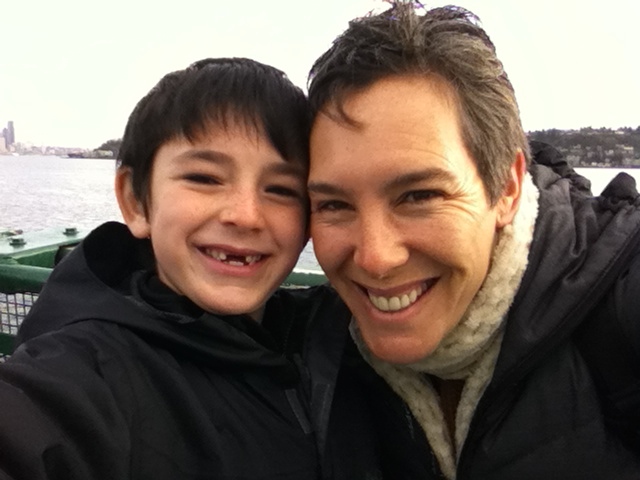This post is part of the 1000 Voices for Compassion movement, an online campaign happening on February 20, 2015 (or on February 21, if you’re an overwhelmed mom of three, trying to cultivate self-compassion…) to flood the blogosphere with kindness, caring, compassion, non-judgement and all around goodness. To read other stories of compassion, check out the hashtag #1000Speak on Facebook and Twitter.
The other day on the way home from school, my 8-year-old suddenly interrupted his own excited play-by-play of his day’s highlights with a roaring rendition of “Tomorrow,” the famous tune from Annie. “The sun will come out tomorrow. Bet your bottom dollar that tomorrow ther’ll be sun…”
“Why are they always talking about the sun,” he asked, interrupting himself yet again.
“Well,” I responded. “The sun is seen as a symbol of brightness, hope, warmth and possibility.” I continued. “Remember that those girls didn’t have parents caring for them. They were stuck in an orphanage with that evil Miss Hannigan, hoping and praying that someone kind would show up at the door, looking to adopt them.”
Again, I was was interrupted. “Miss. Hannigan’s not evil,” my son said, in all seriousness. “She just has special needs.”
As often happens in my parenting journey, I was caught off guard. First I had a good long belly laugh like only those improbable kid proclamations can bring on. And then I felt proud. Yet another children’s movie had attempted to simplify human nature by dividing us into two bland categories of good and evil, all the nuances of our lives left to fall by the wayside. But my 8-year-old was having none of it!
Underneath her alcoholism and abusive behavior, even Miss Hannigan had a story.
What my son knew instinctively, that Miss Hannigan’s behaviors were a call for help that no one was answering, is often lost on us big people. Rather than moving towards others when they show behaviors indicative of struggle, we often pull away, insulting or shaming them for their differences, slaves to our own inner struggles.
I’m not advocating for a free-for-all of dysfunctional or hurtful behavior. Interventions and limit setting are vital. First and foremost we need to keep everyone safe. But we can’t just be compassionate when it comes easily. Having compassion requires taking a virtual trip into the dark depths of those who do wrong by us, or by others, learning their stories, letting go of anger, disappointment or embarrassment, and moving on.
Easy to do, no? But necessary in teaching our boys about compassion. We, adults, are often limited in our ability to be compassionate with those who break certain social norms, and in my life as the mother of three boys and an advocate for young boys and their parents this often looks like a jab, a grab, a hit, a loud voice, a big movement, an inappropriate joke, or a joke at an inappropriate time…The list is long.
Young boys have it hard. For many, from the start of traditional schooling, they are square pegs of energy and curiosity shoved into round holes of sitting quietly at desks, doing what someone else has on their agenda. I think about all the squashed potential! I think about someone forcing me to perform well in a career that taps none of my talents, but only magnifies my struggles and weaknesses. I cringe, experiencing the feelings of embarrassment and shame I imagine I would feel as I tried over and over again to be successful at something that did not come easily, while others criticized and punished.
And outside of school, even where I live today, in what is supposedly one of the most open-minded places on the planet, I constantly see boys’ energy, spirits and feelings being squelched by adults who choose only to be bothered, or even scared by them, rather than appreciate their uniqueness or offer them an ear when they need to talk, a shoulder when they need to cry, or a hand when they are stuck in some unworkable behavior.
As parents, we must work hard to change this! We must reach for our boys when their behaviors are ugly, aggressive, or mean. Keeping sight of their goodness is our job. The more we see it, the more compassion we will feel towards them. And the more love and compassion they feel coming their way, the greater their ability to share their goodness with the world.
It can be hard to see past Miss Hannigan’s screaming and drinking, but we can imagine that her road was a rocky one. And it can be equally difficult to see through a boy’s defiance or anger. But those boys have stories too. In helping our boys share their stories, we are, in effect, cultivating compassion.
1000Speak started with an understanding that even though we might get older, we still all need the metaphorical village around us, and the compassion of others in our lives. Then the sudden thought happened — what if 1000 of us wrote about compassion all at once? From there, the movement has taken on its own life; has burgeoned and grown and spread a whole lot of love and connection and ‘villageyness’.
Spread compassion using the hashtag #1000Speak.
Share your stories of compassion below. I always love to hear!

